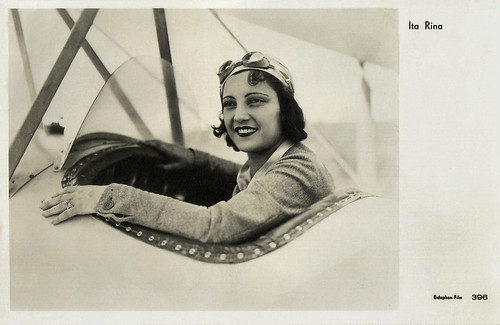
German postcard by Ross Verlag, no. 3324/1, 1928-1929. Photo: Alex Binder, Berlin.
German postcard by Ross Verlag, no. 3324/3, 1928-1929. Photo: Alex Binder, Berlin.

German postcard by Ross Verlag, no. 3555/1, 1928-1929. Photo: Kiesel, Berlin.
Miss Slovenia
Ita Rina was born as Italina Lida ‘Ida’ Kravanja in the small town of Divača (then Austro-Hungarian Empire, later Yugoslavia, now Slovenia) in 1907. She was the first daughter of Jožef and Marija Kravanja. Rina had a younger sister Danica.
Shortly after the outbreak of World War I, the family moved to Ljubljana, where Rina matriculated in 1923. Her dream was to become an actress. In October 1926, Slavic People magazine organized a beauty pageant for a Miss to represent Yugoslavia at the Miss Europe contest. The attractive nineteen-year-old secretly entered the beauty contest, not telling anyone at home.
She was crowned Miss Slovenia and should travel to the final event for Miss Yugoslavia in Zagreb. However, her mother did not want to let her go to Zagreb. After a group visit of the Slovenian delegation, Marija Kravanja slacked. Unfortunately, when Rina arrived in Zagreb, the jury was already choosing the most beautiful of three finalists.
However, she was noticed by Adolf Müller, the owner of Balkan Palace cinema in Zagreb. He sent her photographs to German film producer Peter Ostermayer, who invited her to come to Germany. As her mother did not want to let her go to Berlin, Rina ran away from home and arrived in Berlin in 1927.
After her first audition, she had classes in acting, diction, dancing, driving, and riding. She made her film debut in the leading role in Was die Kinder ihren Eltern verschweigen/What Do Children Hide from Their Parents (Franz Osten, 1927) with Mary Johnson. After some small film roles in 1927 and 1928, the critics noticed her in Das letzte Souper/The Last Supper (Mario Bonnard, 1928) starring Marcella Albani.
That same year, Rina met her future husband Miodrag Đorđević, a student. Her big breakthrough came the following year, opposite Olaf Fjord in Erotikon/Seduction (1929), directed by Gustav Machatý. She was starring in the leading female role, Andrea. The film was a great success but also upset some moral and Christian organisations.
Robert J. Maxwell at IMDb loved Rina’s performance: “She's a beauty by any metric. Her eyes are slanted and large. When she's excited, the irises are surrounded entirely by the whites. I can't do that. I just tried it in the mirror. And her nose is exquisite. It begins between her eyebrows, disregarding the usual need for a glabella, and cleaves her features in two. That nose is magnetic, exactly the right size for nibbling.”
Austrian postcard by Iris-Verlag, no. 5118. Photo: Kiesel, Berlin.
French postcard by Europe, no. 917. Photo: Studio Waroline.
Atomic war bride
In 1930, Ita Rina acted in three films, the most notable being the first talking Czech film Tonka Šibenice/Gallows Toni (Karl Anton, 1930). The title part in this film is often named as her best role. In 1931, she married Miodrag Đorđević and changed her religion from Roman Catholic to Serbian Orthodox. Rina was baptised in the Russian Orthodox Church, and also got her new Orthodox name, Tamara Đorđević.
Now at the height of her career, she earned 15,000 marks per month and was an idol to teenagers as well as to modern emancipated women. The same year, Rina was given an offer from Hollywood, but her husband forced her to choose between her career and their marriage. Rina chose to stay with him. Although she had announced her retirement from the cinema, she acted until the outbreak of World War II.
Her last film appearance was in the crime drama Zentrale Rio/Central Rio (Erich Engels, 1939) co-starring Leny Marenbach and Camilla Horn. Rina and her husband settled in Belgrade. In 1940, she gave birth to their son Milan. After the bombing of Belgrade in 1941, the family moved to Vrnjačka Banja, where Rina gave birth to a daughter, Tijana. They moved back to Belgrade after the end of World War II in 1945.
Although she was promised several roles in Yugoslav films, all projects were cancelled. After she had written to President Tito, Rina began working as a co-production advisor for Avala Film. She returned to the silver screen once, in the Science-Fiction drama Rat/Atomic War Bride (Veljko Bulajić, 1960). The film, which deals with the horrors of the atomic weapon era, won three Golden Arena awards at the 1960 Pula Film Festival, including for Best Director (Veljko Bulajić), Best Actor (Antun Vrdoljak) and Best Scenography (Duško Jeričević), and was nominated for the Golden Lion award at the 1960 Venice Film Festival. It was her last role.
As she was ill of asthma, Rina and her husband moved to Budva (then Yugoslavia, now Montenegro) in 1967. There, she was taking care of her husband, who was ill of sclerosis. Ita Rina died in 1979 in Budva of an asthmatic attack. She was buried a few days later in Belgrade, in the presence of numerous film artists, admirers, friends, and family.
A decade ago, the Slovenian Cinematheque mounted a permanent exhibition of the actress’s photos and posters at the Škrjateljnova domačija, the house where she was born. The Slovenian Cinematheque also marked the recent centennial of her birth by reprinting a monograph on her life and work, now in an extended edition complete with English translations.
German postcard by Ross Verlag, no. 3766/1, 1928-1929. Photo: Alex Binder, Berlin.

German postcard by Ross Verlag, no. 3914/1, 1928-1929. Photo: Kiesel, Berlin.

Dutch postcard by JosPe, no. 396. Photo: Eidophon-Film. Ita Rina in Das Lied der Schwarzen Berge/Fantom Durmitora/The Song of the Black Mountains (K. Breiness, Hans Natge, 1933).
Sources: Slovenia.si, Wikipedia, and IMDb.
No comments:
Post a Comment